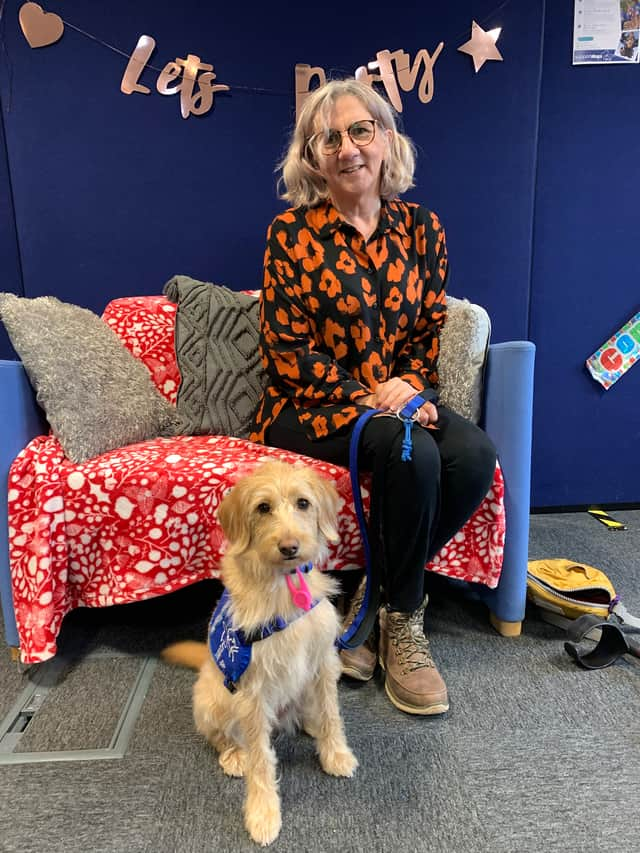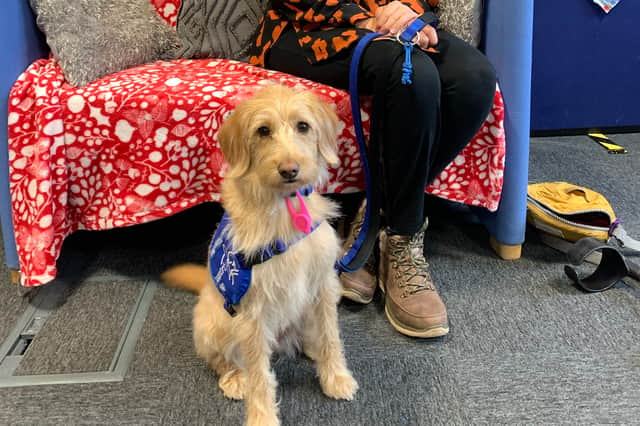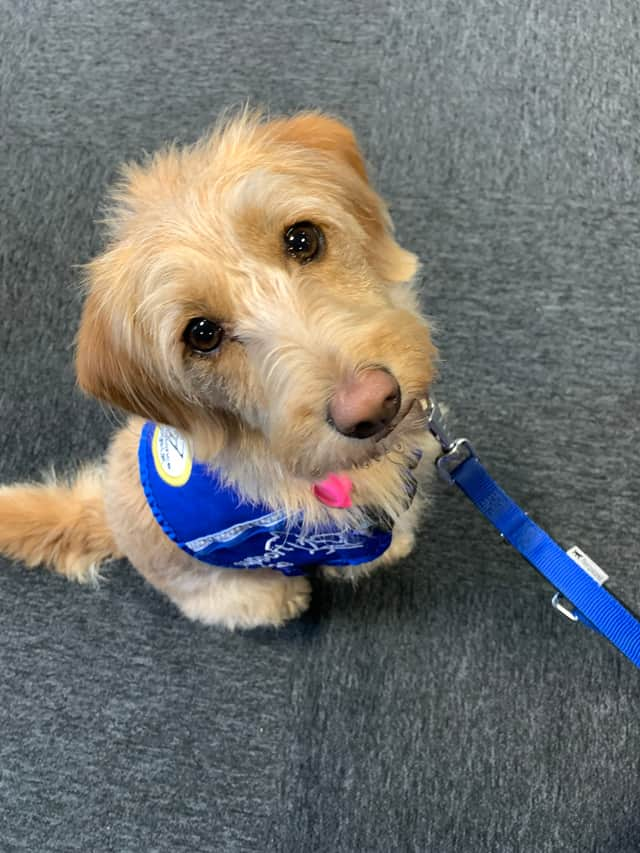Newcastle support dog gives disabled woman her life back and continue her career
and live on Freeview channel 276
A support dog has changed the life of a woman from Newcastle after a neuro-muscular condition got 'progressively worse.'
Frankie, a two-year-old miniature Labradoodle has just qualified as an assistance dog, trained by national charity Support Dogs and now makes an incredible difference to Sharon's work and home life. Frankie can now empty the washing machine, get the post and find her owner's mobile phone.
Advertisement
Hide AdAdvertisement
Hide Ad

Sharon, 54, of Newcastle, has congenital myasthenia, a neuro-muscular condition characterised by muscle weakness which worsens with exertion. The mother-of-four and grandmother-of-two was recently diagnosed, though she says she has had symptoms “forever” and they worsened over time.
It’s a condition so rare, Sharon, her daughter Jemma and grandson Brandon attend Newcastle’s Life Science Centre, an educational science museum and pioneering science village, where they help with research into the disease.
It makes walking very painful, leaves her fatigued and can result in her falling over numerous times a day.
Things that able-bodied people can do, like forgetting to shut the door once they’re already seated, can be a huge task for Sharon, who uses a walking stick.
Advertisement
Hide AdAdvertisement
Hide AdBut thanks to Frankie – Sharon’s pet dog who has been trained through Support Dogs’ Disability Assistance Programme – she is managing to retain her independence.
Sharon, who works as an independent advocate supporting people with a range of issues, said: “Frankie was primarily a pet. I got her at the end of lockdown because I had become an absolute recluse. I didn’t need to go out for work; I didn’t need to go out at all.
“But then I thought, if I got a dog, and if I could get her trained, maybe she could help me in the house.”
Now Frankie helps Sharon with a range of tasks, whether at home or at work.
Advertisement
Hide AdAdvertisement
Hide Ad

“She picks things up, she can open and shut doors and empties the washing machine.
“She finds my mobile phone if I’ve lost it upstairs and if I’m upstairs in the office when the post comes, she goes downstairs to get it.”
And beyond her home office, Frankie helps to ensure Sharon can continue in her career – the pooch is a familiar sight accompanying Sharon to court.
“She enables an easier working day,” said Sharon.
“It takes up a lot of energy – at night I literally have none.
Advertisement
Hide AdAdvertisement
Hide Ad“But she goes everywhere with me – she’s been to court and even plays with the judge.”
Sharon has had Frankie since she was eight weeks old and after doing a Google search on training assistance dogs, she came across Support Dogs, a national charity which provides and trains assistance dogs to help autistic children and people with epilepsy or a physical disability.


She had tried teaching Frankie herself, through Youtube videos, but she says having Support Dogs on board helped make sure Frankie was fully capable of assisting her, with added reassurance.
After interviews and assessments, the pair began training last January.
Advertisement
Hide AdAdvertisement
Hide AdSharon and Frankie qualified as a partnership in October, after 10 months of intense training.
“It’s a huge relief,” said Sharon. “I knew she could do it, it was just whether she was going to do it on the day. She’s amazing.
“I can drop something, and before I have even turned around, Frankie has come along, picked it up and given it back to me. She does a lot now without even thinking about it.”
And it’s not just physical help that Frankie gives to Sharon – she is an emotional crux.
Advertisement
Hide AdAdvertisement
Hide Ad“It’s that emotional and mental confidence, to go out and to do stuff,” she said.
“To maybe places I wouldn’t necessarily go before.
“I can’t thank Support Dogs enough – everyone has been amazing.”
Congratulating Frankie and Sharon, Natasha Ellis, assistant training manager at Support Dogs, dispelled the myth that only Labradors can be assistance dogs.
“The best thing about our Disability Programme is we get to train a variety of dogs, such as little Frankie who we trained recently,” she said.
Advertisement
Hide AdAdvertisement
Hide Ad“Most people think when they see an assistance dog out and about working, they are going to see a Labrador. But with us, they might see anything from a Jack Russell to a Border Terrier to a Labrador.”
She added: “Frankie was a delight to have around the training centre. She was such a character, with bundles of energy and she absolutely loved her taskwork. The more she could do, the better for Sharon.”
To find out more about Support Dogs, please visit www.supportdogs.org.uk
Comment Guidelines
National World encourages reader discussion on our stories. User feedback, insights and back-and-forth exchanges add a rich layer of context to reporting. Please review our Community Guidelines before commenting.